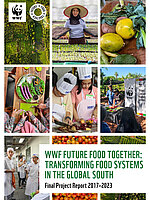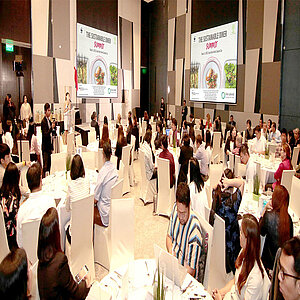Bringing sustainable palm oil, pulp & paper products into Indonesian retail

Constructive discussions with retail industry, politicians and other stakeholders at 1st workshop for Sustainable Retailers Platform.
On November 27th, 2018 at Pullman Hotel Thamrin Jakarta, WWF-Indonesia, facilitated by Accenture and GlobeScan, invited retail industry stakeholders to join the roundtable on “Synergizing Retail Industry Stakeholders on Mainstreaming Sustainable Products for Domestic Market”.
The event was attended by different institutions including the Ministry of Trade, palm oil producers and refiners, packaging companies, supermarkets, Fast-moving consumer goods (FMCG) manufacturers, restaurant chains, hotels, bank, and NGOs. The aims of this event were to achieve a common understanding of challenges and opportunities in bringing sustainable palm oil, pulp, and paper products into Indonesian retail; to obtain consensus from workshop participants (companies, NGOs, government) on the type of dialogue platform that will most effectively contribute to shifting domestic palm oil, pulp and paper supply chains toward sustainability; as well as to achieve buy-in from participants to contribute to the multi-stakeholder dialogue on sustainable supply chains.
The roundtable was kicked off by Aditya Bayunanda, Policy and Advocacy Director of WWF Indonesia, stressing that the Government of Indonesia had comprehensive policies that were aligned with sustainability efforts, yet there was still room for implementation and enforcement on the ground. It is a shared responsibility of related stakeholders to identify and overcome barriers on developing sustainable environment. Dr I Gusti Ketut Astawa, Director of Business Development and Distribution Actors of the Ministry of Trade, highlighted that the government certainly supported sustainability but that it was not compulsory for the private sector to implement corresponding measures. The Director expressed the concern that with compulsory regulations, the whole industry would have a significant effort to adjust, hitting small and medium enterprises (SMEs) especially hard. He also explained that the main role of government was overseeing the regulation, being the facilitator and the supervision.

GlobeScan and Accenture, consultant agencies hired by WWF Indonesia, presented two studies on 1) Lessons Learned, Challenges and Opportunities in Corporate Engagement Strategy Development for Sustainable Palm Oil, and 2) Sustainability Maturity Assessment Results on value chain for Palm Oil and Pulp and Paper. GlobeScan provided participants with an overall understanding of the current situation of palm oil both in domestic and global markets. The agency also explained the recent trend of consumers’ trust in corporations and their perception on sustainable palm oil. One of the main challenges the consultants expressed was that the awareness of sustainable palm oil among companies and consumers in Indonesia needs to be upscaled. Moreover, Accenture explained the current domestic retailers’ maturity towards sustainability. In general, there is still a gap between national and multi-national companies in understanding and implementing sustainability principles in their business decision-making. To address this and other challenges, all stakeholders should be proactively working together, and this could be facilitated in a form of dialogue platform. On the flip side, finance industry is also making its own way towards sustainability as WWF Indonesia established the Indonesian Sustainable Finance Initiative in May 2018 that involves financial regulators and institutions. There are quite extensive risks in market regulation and reputation that investors or financial institutions must face when they fund the private sector. This does not necessarily mean all the funding needs to stop immediately but rather to collaborate on how these sectors can shift more towards sustainable manner.
 Part of the roundtable was intended to collect participants’ voices about how they perceive and understand the topic. The participants were divided into five groups and given two specific topics. The first topic was about how to increase the up to date rather low awareness of sustainability, how to identify the main stakeholders in this field and how to approach them. In this context it appeared that government incentives and advocacy were the most important drivers for sustainable behavior. Strong government support is needed to consolidate existing regulations for sustainable products and providing financial incentives for the private sector. The less difficult but still important challenge is the need for a comprehensive yet easy to understand campaign on sustainability in mainstream media and possibly formal education, such as school, to increase knowledge about the importance of sustainability among consumers and the general public.
Part of the roundtable was intended to collect participants’ voices about how they perceive and understand the topic. The participants were divided into five groups and given two specific topics. The first topic was about how to increase the up to date rather low awareness of sustainability, how to identify the main stakeholders in this field and how to approach them. In this context it appeared that government incentives and advocacy were the most important drivers for sustainable behavior. Strong government support is needed to consolidate existing regulations for sustainable products and providing financial incentives for the private sector. The less difficult but still important challenge is the need for a comprehensive yet easy to understand campaign on sustainability in mainstream media and possibly formal education, such as school, to increase knowledge about the importance of sustainability among consumers and the general public.
The second topic was about opportunities and challenges when it comes to sustainable sourcing. It seemed that the price component and law enforcement remain the main concerns while continuous supply of sustainable materials is more feasible. Looking at the demand side, regulation, consumer behavior, and government incentives are the possible drivers to render sustainability as a new norm. How to get consumers to buy sustainable products? They need to be better informed through campaigns, more product choices in the shelves, and engagement in social media platforms.
Insights taken from this event were that market-based approaches can help incentivize sustainable production and bring sustainable products to retail, but a broader engagement of government and other stakeholders is also needed to incentivize sustainable sourcing. Finally, public and private financial institutions are also critical players, as they can use financial incentives and other forms of leverage to encourage retailers to implement sustainability principles within their business operations.
The link has been copied to the clipboard
Contact
IKI Office
Zukunft – Umwelt – Gesellschaft (ZUG) gGmbH
Stresemannstraße 69-71
10963 Berlin








![[Translate to English:] Cover Beyond research: Nachhaltigkeit im Food-Service-Sektor](/legacy/Bilder/2020/20200707_Cover_Beyond_research.jpg)


![[Translate to English:]](/legacy/_processed_/f/5/csm_20200911_organic_agriculture_in_Nan_province_e0f204d31c.jpg)

